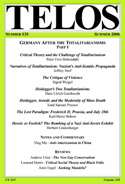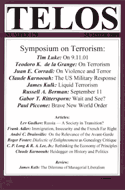On Tuesdays at TELOSscope, we reach back into the archives and highlight an article whose critical insights continue to illuminate our thinking and challenge our assumptions. Today, Andrew Walker looks at Peter Uwe Hohendahl’s “Critical Theory and the Challenge of Totalitarianism,” from Telos 135 (Summer 2006).
 Totalitarianism is a curious phenomenon of modern history and is often said to be a very twentieth-century one, at least as far as developed liberal democracies are concerned. The archetype totalitarian states in Nazi Germany and Fascist Italy defined their political order against the established liberal democratic systems that existed elsewhere in Europe, and we saw them off. Further backslapping was called for when the Soviet Empire disintegrated and democracy was able to spread throughout Eastern Europe. But, as should be expected with conceptual discussions such as these, it is not as simple as it first appears. Critical Theory in the Frankfurt School tradition began to reach maturity in the context of a totalitarian Europe; the analyses of social structures and processes within modernity are shaped by the Fascist or Soviet state. But the categories of critique developed at this stage of Critical Theory are not anachronistic curiosities. The term “totalitarian” is a tricky one to define and apply. Peter Uwe Hohendahl’s article “Critical Theory and the Challenge of Totalitarianism” is both a historical discussion of the development, but also of the wider applicability, of ideas and theories surrounding totalitarianism.
Totalitarianism is a curious phenomenon of modern history and is often said to be a very twentieth-century one, at least as far as developed liberal democracies are concerned. The archetype totalitarian states in Nazi Germany and Fascist Italy defined their political order against the established liberal democratic systems that existed elsewhere in Europe, and we saw them off. Further backslapping was called for when the Soviet Empire disintegrated and democracy was able to spread throughout Eastern Europe. But, as should be expected with conceptual discussions such as these, it is not as simple as it first appears. Critical Theory in the Frankfurt School tradition began to reach maturity in the context of a totalitarian Europe; the analyses of social structures and processes within modernity are shaped by the Fascist or Soviet state. But the categories of critique developed at this stage of Critical Theory are not anachronistic curiosities. The term “totalitarian” is a tricky one to define and apply. Peter Uwe Hohendahl’s article “Critical Theory and the Challenge of Totalitarianism” is both a historical discussion of the development, but also of the wider applicability, of ideas and theories surrounding totalitarianism.
 It is often cited as the founding text of Critical Theory in the Frankfurt School tradition. Even Michel Foucault is said to have claimed that he could have saved himself a lot of time had he read Dialectic of Enlightenment years earlier. The book draws together threads from Weber, Freud, Lukács, and Marx in order to show the authors’ view of modernity as a world of restricted thought and suppressed alternatives. Rather than bringing forth a new age of human emancipation, the rise of Enlightenment reason has led to new forms of domination, it has become its opposite, it has reverted to myth. The book analyzes the all-pervasiveness of commoditizing social relations, the totalizing presence of cultural production, and the domination of the critical faculties of rational thought. Though its importance is widely recognized, Dialectic of Enlightenment has often been dismissed as being pessimistic to the point of anachronistic. It should continue to be read and re-read, however, as there is still a great deal of insight into the one-dimensionalism of dominant social thought within its pages.
It is often cited as the founding text of Critical Theory in the Frankfurt School tradition. Even Michel Foucault is said to have claimed that he could have saved himself a lot of time had he read Dialectic of Enlightenment years earlier. The book draws together threads from Weber, Freud, Lukács, and Marx in order to show the authors’ view of modernity as a world of restricted thought and suppressed alternatives. Rather than bringing forth a new age of human emancipation, the rise of Enlightenment reason has led to new forms of domination, it has become its opposite, it has reverted to myth. The book analyzes the all-pervasiveness of commoditizing social relations, the totalizing presence of cultural production, and the domination of the critical faculties of rational thought. Though its importance is widely recognized, Dialectic of Enlightenment has often been dismissed as being pessimistic to the point of anachronistic. It should continue to be read and re-read, however, as there is still a great deal of insight into the one-dimensionalism of dominant social thought within its pages. 

